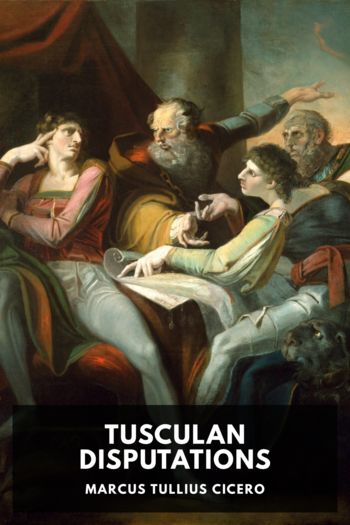Tusculan Disputations - Cicero (red novels TXT) 📗

- Author: Cicero
Book online «Tusculan Disputations - Cicero (red novels TXT) 📗». Author Cicero
In heaven Romulus with Gods now lives,
as Ennius says, agreeing with the common belief. Hence, too, Hercules is considered so great and propitious a God among the Greeks, and from them he was introduced among us, and his worship has extended even to the very ocean itself. This is how it was that Bacchus was deified, the offspring of Semele. And from the same illustrious fame we receive Castor and Pollux as Gods, who are reported not only to have helped the Romans to victory in their battles, but to have been the messengers of their success. What shall we say of Ino, the daughter of Cadmus? Is she not called Leucothea by the Greeks, and Matuta by us? Nay, more; is not the whole of heaven (not to dwell on particulars) almost filled with the offspring of men?
Should I attempt to search into antiquity, and produce from thence what the Greek writers have asserted, it would appear that even those who are called their principal Gods were taken from among men up into heaven.
Examine the sepulchres of those which are shown in Greece; recollect, for you have been initiated, what lessons are taught in the mysteries; then will you perceive how extensive this doctrine is. But they who were not acquainted with natural philosophy (for it did not begin to be in vogue till many years later) had no higher belief than what natural reason could give them. They were not acquainted with the principles and causes of things. They were often induced by certain visions, and those generally in the night, to think that those men who had departed from this life were still alive. And this may further be brought as an irrefragable argument for us to believe that there are Gods: that there never was any nation so barbarous, nor any people in the world so savage, as to be without some notion of Gods. Many have wrong notions of the Gods, for that is the nature and ordinary consequence of bad customs, yet all allow that there is a certain divine nature and energy. Nor does this proceed from the conversation of men, or the agreement of philosophers; it is not an opinion established by institutions or by laws; but, no doubt, in every case the consent of all nations is to be looked on as a law of nature. Who is there, then, that does not lament the loss of his friends, principally from imagining them deprived of the conveniences of life? Take away this opinion, and you remove with it all grief, for no one is afflicted merely on account of a loss sustained by himself. Perhaps we may be sorry, and grieve a little, but that bitter lamentation and those mournful tears have their origin in our apprehensions that he whom we loved is deprived of all the advantages of life, and is sensible of his loss. And we are led to this opinion by nature, without any arguments or any instruction.
But the greatest proof of all is that nature herself gives a silent judgment in favor of the immortality of the soul, inasmuch as all are anxious, and that to a great degree, about the things which concern futurity:
One plants what future ages shall enjoy,
as Statius says in his Synephebi. What is his object in doing so, except that he is interested in posterity? Shall the industrious husbandman, then, plant trees the fruit of which he shall never see? And shall not the great man found laws, institutions, and a republic? What does the procreation of children imply, and our care to continue our names, and our adoptions, and our scrupulous exactness in drawing up wills, and the inscriptions on monuments, and panegyrics, but that our thoughts run on futurity? There is no doubt but a judgment may be formed of nature in general, from looking at each nature in its most perfect specimens; and what is a more perfect specimen of a man than those are who look on themselves as born for the assistance, the protection, and the preservation of others? Hercules has gone to heaven; he never would have gone thither had he not, while among men, made that road for himself. These things are of old date, and have, besides, the sanction of universal religion.
What will you say? What do you imagine that so many and such great men of our republic, who have sacrificed their lives for its good, expected? Do you believe that they thought that their names should not continue beyond their lives? None ever encountered death for their country but under a firm persuasion of immortality! Themistocles might have lived at his ease; so might Epaminondas; and, not to look abroad and among the ancients for instances, so might I myself. But, somehow or other there clings to our minds a certain presage of future ages; and this both exists most firmly, and appears most clearly, in men of the loftiest genius and greatest souls. Take away this, and who would be so mad as to spend his life amidst toils and dangers? I speak of those in power. What are the poet’s views but to be ennobled after death? What else is the object of these lines,
Behold old Ennius here, who erst
Thy fathers’ great exploits





Comments (0)